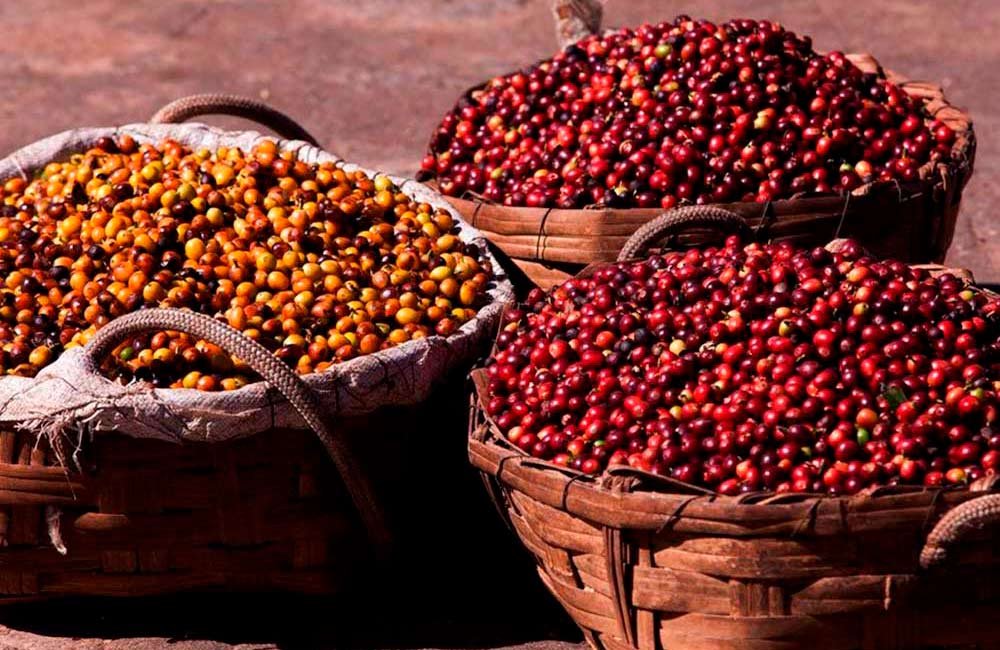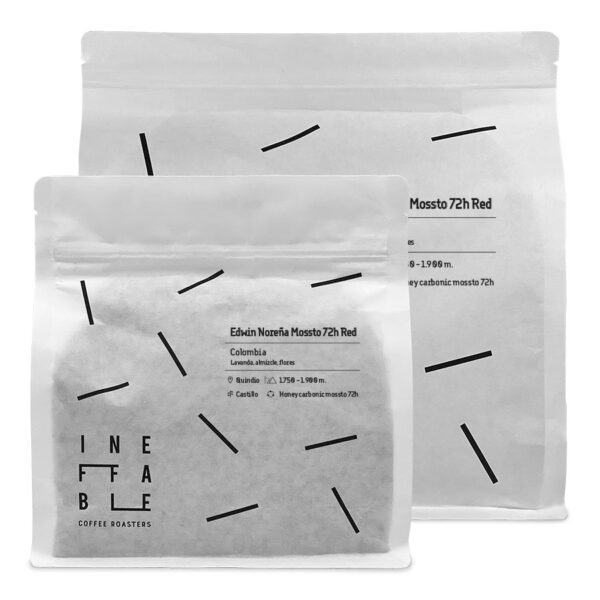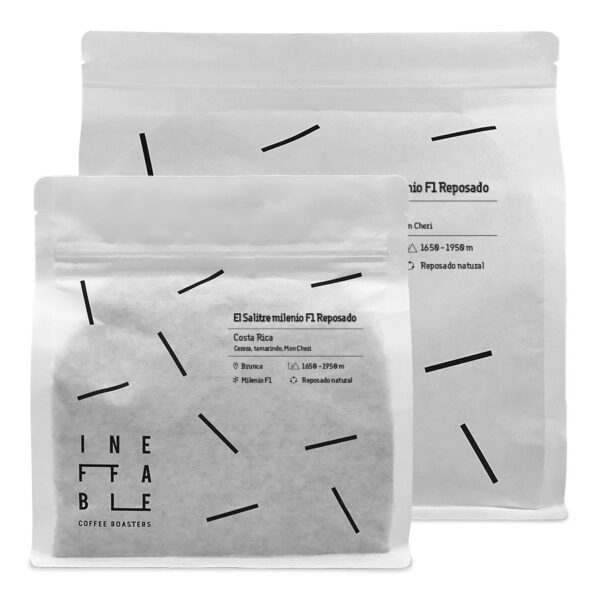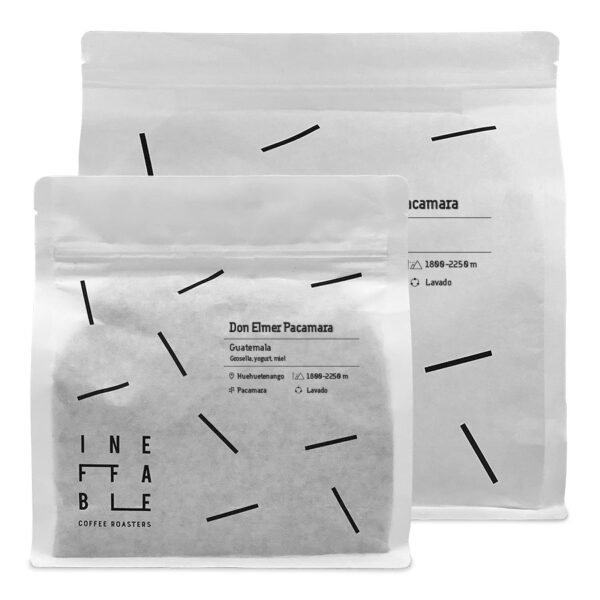Brazil is a coffee giant that has shaped its culture, economy and landscape through coffee. This country not only leads in production volume, but has also become a reference in quality, diversity and innovation in specialty coffee. From its vast producing regions to advanced cultivation techniques, Brazil offers a unique experience in every cup.
In this article, we explore the history, regions, cultivation methods, harvest season and how to enjoy Brazilian coffees to the fullest.
1. History of coffee in Brazil
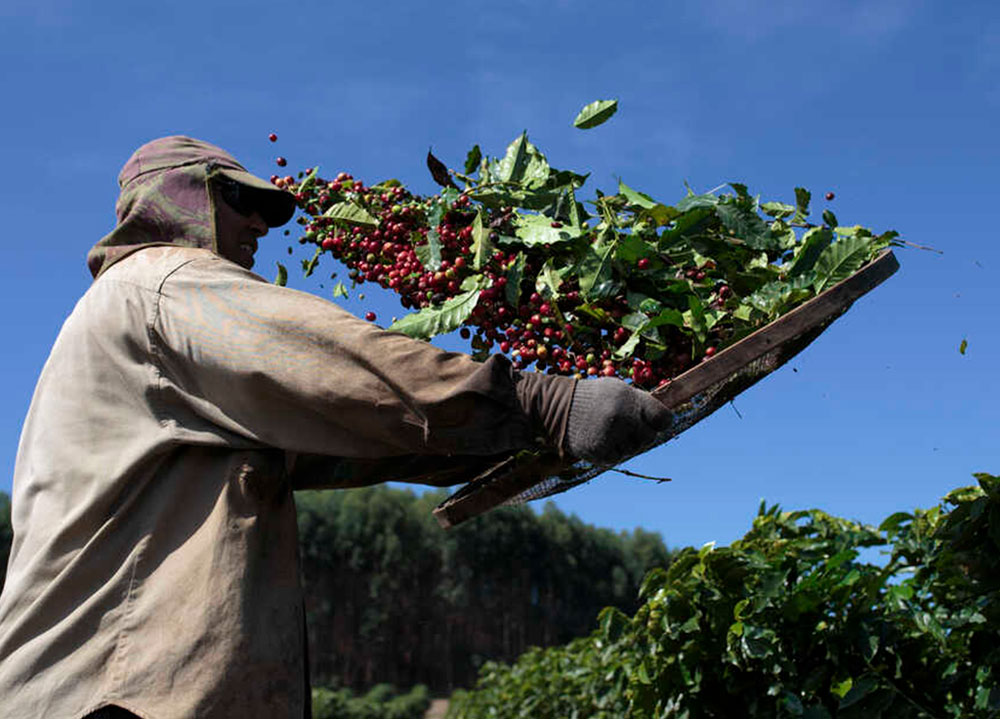
Brazilian coffee has a long and deeply rooted history
Brazil, the world’s largest coffee producer, has a fascinating history that reflects how this crop has shaped its economy and culture. From its arrival in the 18th century to its current position as a benchmark in specialty coffee, the journey of Brazilian coffee is full of key moments.
The arrival of coffee in Brazil
Coffee arrived in Brazil in 1727 thanks to Francisco de Melo Palheta, a Portuguese-Brazilian official who obtained the first seeds in a curious diplomatic incident. During a territorial conflict between France and the Netherlands, Palheta traveled to French Guiana, where, according to the story, Madame D’Orvilliers, wife of the governor of Cayenne, gave him coffee seeds hidden in a bouquet of flowers. These seeds were planted in the state of Pará, marking the beginning of a new era for Brazil.
Initially, coffee was cultivated only for local consumption, but the growing demand in America and Europe during the 19th century boosted its expansion. By 1770, the plantations had already reached Rio de Janeiro, and in 1830 coffee became the country’s main export product, consolidating its position in the international market.
The Development of the Coffee Industry in Brazil
Throughout the centuries, the Brazilian coffee industry has gone through diverse stages that have defined its trajectory:
1. The beginnings and expansion (1727-1820):
After its first planting in Pará, coffee cultivation spread southward, reaching Rio de Janeiro in 1770.
During this period, coffee was cultivated mainly for internal consumption, but external demand in the 19th century boosted the expansion of plantations.
2. The export boom (1820-1888):
Between 1820 and 1888, Brazil began to produce 20% of the world’s coffee. Rio de Janeiro, São Paulo and Minas Gerais led this production.
In 1830, coffee was consolidated as the main Brazilian export product.
During this period, the industry relied heavily on slave labor, until the abolition of slavery in 1888, which led to significant changes in the labor force.
3. Stabilization and expansion (1888-1945):
At the beginning of the 20th century, Brazil implemented price stabilization programs, such as the Taubaté Agreement in 1906, to protect coffee growers against market fluctuations.
During the First World War, international agreements were initiated to stabilize coffee prices, which helped Brazil to maintain its leadership.
4. Quality improvement and diversification (1990-present):
Since the 1990s, Brazil has taken a turn towards quality. The Brazil Specialty Coffee Association (BSCA) was established, and competitions such as the “Cup of Excellence” have raised the profile of Brazilian specialty coffee.
Regions such as Piata, Carmo de Minas, and Vale da Grama have become synonymous with quality, producing internationally awarded coffees.
The current legacy
Specialty coffee in Brazil is the result of centuries of innovation and dedication. From its humble beginnings to its transformation into a high quality export product, Brazilian coffee not only represents an economic pillar, but also a cultural emblem that connects the country with the rest of the world. Today, each cup of Brazilian specialty coffee tells a story of tradition, effort and innovation that continues to evolve.
2. Coffee growing regions in Brazil
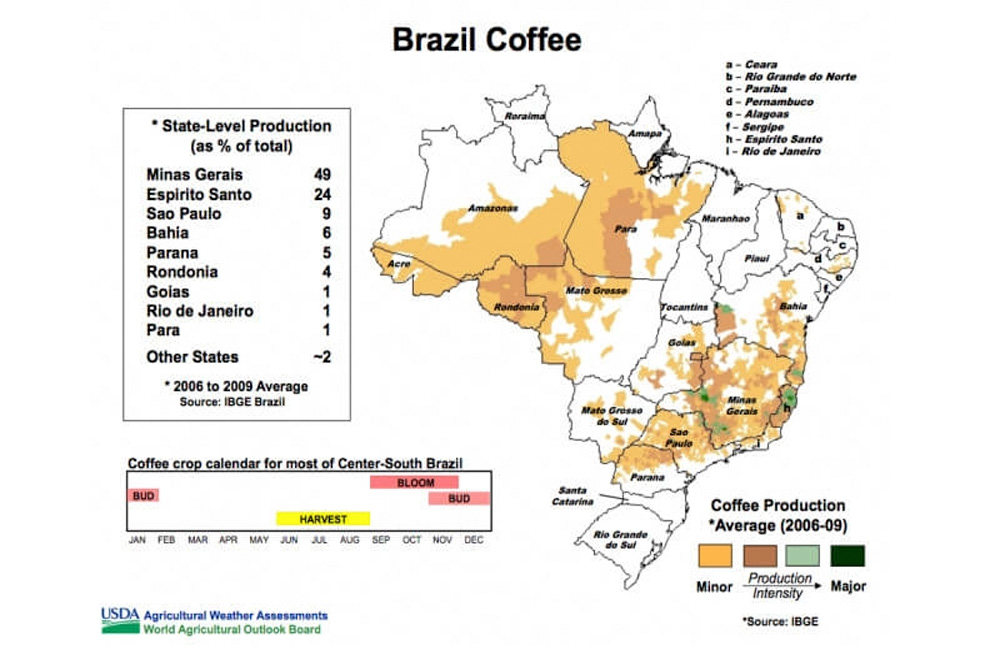
Main coffee growing areas in Brazil
Brazil has a wide variety of coffee growing regions, each with unique geographical and climatic characteristics that influence the profile and quality of the coffee produced. From high altitudes to tropical climates, the country offers ideal conditions for the cultivation of both Coffea arabica and robusta coffee.
Main Coffee Growing Regions of Brazil
1. Minas Gerais
Location: Located in the southeast of Brazil, it is the largest coffee growing region in the country.
Outstanding sub-regions:
Sul de Minas: Recognized for its coffees with full body, balanced acidity and notes of chocolate and caramel.
Cerrado Mineiro: The first region in Brazil with denomination of origin, famous for its high quality coffees with sweet and consistent profiles.
Altitude and climate: Elevations between 800 and 1,300 meters above sea level with a temperate climate that favors uniform growth.
2. São Paulo
Location: South of Minas Gerais, especially the Mogiana region.
Characteristics: Mild coffees with notes of chocolate, almonds and nuts, thanks to a moderate climate and altitudes between 800 and 1,200 meters above sea level.
Importance: One of the historical regions for the production of coffee, key during the boom of the 19th century.
3. Espírito Santo
Location: Northeast of Minas Gerais.
Production: Recognized for its cultivation of robusta (conilon) and arabica, adapting to a humid tropical climate and altitudes of 400 to 1,000 meters above sea level.
Profile: Coffees with strong and earthy notes, ideal for blends.
4. Bahia
Location: In northeastern Brazil, with special emphasis on the Chapada Diamantina sub-region.
Characteristics: A dry and semi-arid tropical climate combined with altitudes between 800 and 1,200 meters above sea level.
Profile: Complex and exotic coffees with bright acidity and citrus notes.
5. Paraná
Location: In the south of Brazil, it is a less extensive but significant region for quality Arabica.
Altitude and climate: Elevations from 700 to 1,000 meters above sea level with a cool subtropical climate that contributes to slow growth and balanced profiles.
Altitude
The highest regions, above 1,000 meters above sea level, are ideal for producing high quality beans. At these altitudes, coffee plants grow more slowly, which allows the development of dense and complex beans with a complex flavor.
In Brazil, many regions such as Minas Gerais and Bahia reach optimal altitudes for the cultivation of Arabica.
Climate
Moderate climates with prolonged dry seasons, such as in Minas Gerais and São Paulo, help control pests and create ideal conditions for harvesting.
Humid tropical climates, such as Espírito Santo, promote vigorous growth and richer robusta profiles.
Topography
The combinations of hills and plains in regions such as Cerrado Mineiro create unique microclimates, favoring the development of different types of coffee.
The mountainous terrain of Sul de Minas provides good drainage, which contributes to coffees with clean and well-structured profiles.
3. Types of Coffee from Brazil: Main Varieties
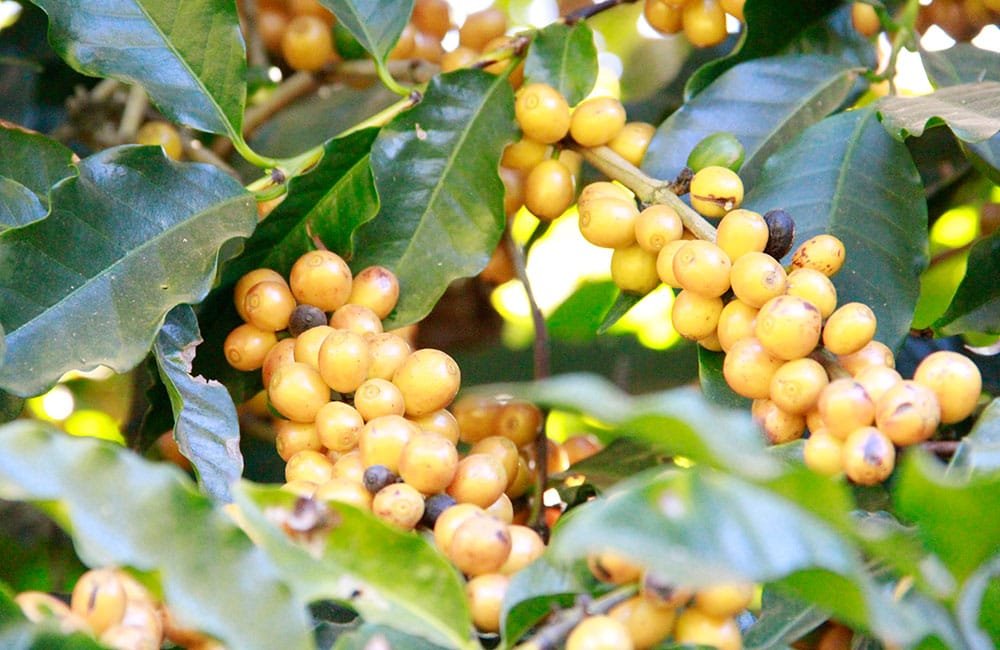
Coffee cherries in the ripening process
Brazil is a country known for the diversity of coffee varieties grown, with a predominant focus on Coffea arabica and a significant production of robusta (conilon). These varieties reflect the richness of its coffee growing regions and the innovative agricultural practices employed by its producers.
Arabica: The Star of Brazilian Coffee
Brazil is one of the largest Arabica producers in the world, and cultivates several varieties with unique characteristics:
Bourbon
Characteristics: One of the oldest varieties of Arabica, known for its red (Bourbon Vermelho) and yellow (Bourbon Amarelo) variants. The beans are rounder than other varieties such as Typica.
Growing conditions: Adapts well to altitudes between 1,000 and 2,000 meters above sea level, with high humidity and constant rainfall throughout the year.
Flavor profile: Natural sweetness and smoothness, with notes of fruits and flowers, subtle acidity and a long aftertaste. Includes flavors such as caramel, honey, berries and citrus.
Mundo Novo
Characteristics: A hybrid between Typica and Bourbon, discovered in Brazil in the 1940’s. It represents approximately 40% of the arabica coffee production in the country.
Flavor Profile: Sweet, with full body, notes of chocolate, almond and hazelnut, and low acidity. Mild and prolonged aftertaste.
Catuai
Characteristics: A cross between Mundo Novo and Caturra, climate resistant and high yielding. Available in red and yellow varieties.
Flavor Profile: Natural honey-like sweetness with fresh, rich flavors of berries, apples and citrus. Medium acidity balanced with sweetness.
Caturra
Characteristics: A natural mutation of Bourbon, with more compact size and higher yield.
Flavor Profile: Notes of fruits such as orange, apple and berries, with bright acidity and sweetness similar to brown sugar or honey.
2. Robusta (Conilon): Strength and resilience.
Although the main focus of Brazil is Arabica, Robusta constitutes between 20% and 30% of the total production of coffee in the country, standing out in regions such as Espírito Santo and Rondônia.
Characteristics of Robusta
Smaller, rounder and more uniform beans.
Resistant to pests and diseases, ideal for warm climates and low altitudes (400-1,000 meters above sea level).
Espírito Santo leads the production, with 80% of the national robusta production.
Flavor profile
Strong and bitter flavor, with less acidity than arabica.
Predominant notes of wood, earth and cashew, with a smoky or burnt touch.
Dense body and heavy texture, ideal for blends seeking strength.
3. Comparison between Arabica and Robusta in Brazil
Characteristic Arabica Robusta
Cultivation altitude 800-2,000 masl 400-1,000 masl 400-1,000 masl
Climate Tropical/subtropical, temperate Tropical humid
Flavor profile Sweetness, balanced acidity, floral Bitter, heavy-bodied, earthy
Main Usage Specialty coffees Blends and instant coffees.
The diversity of coffee varieties in Brazil allows the country to attend a wide range of preferences and markets. While arabica leads the production of specialty coffee, robusta satisfies the high demand for coffee in blends and industrial uses. This combination makes Brazil a giant capable of adapting to global trends without losing its unique identity in the industry.
Enjoy our seasonal coffee, visit our store.
- Filter & EspressoCold BrewSpecial process
Edwin Noreña Red – Colombia – Mossto 72h Co-fermented
36,00€ – 132,00€ VAT included - Filter & Espresso
El Salitre Milenio F1 – Costa Rica – Reposado natural
27,00€ – 99,00€ VAT included - Filter & Espresso
Don Elmer Pacamara – Guatemala – Washed
25,00€ – 89,00€ VAT included
4. Methods of cultivation and processing of coffee in Brazil
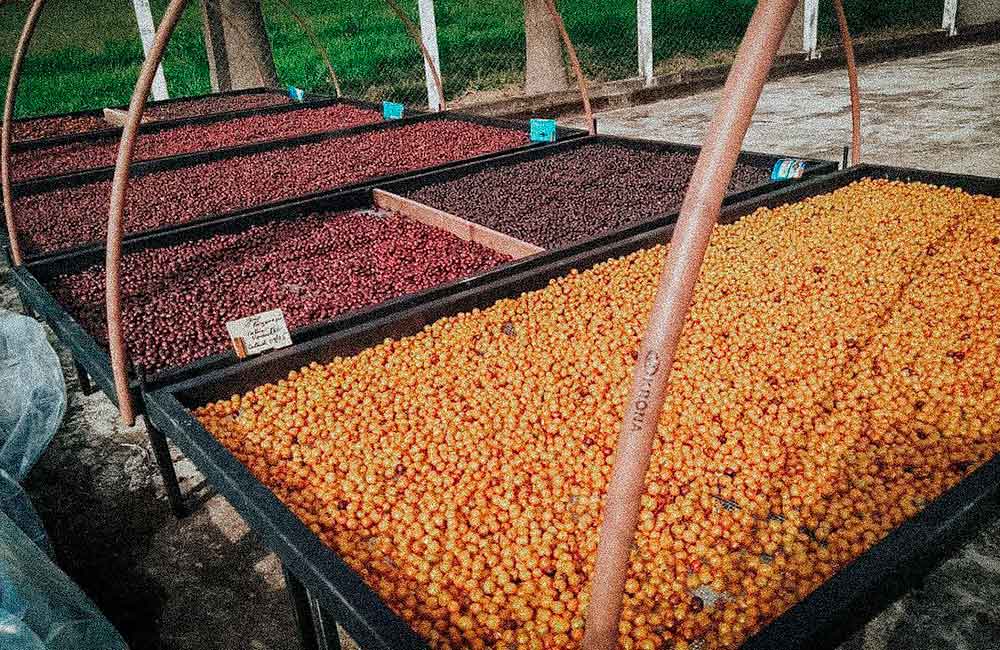
Coffee processing in Brazil
Brazil not only benefits from its ideal natural conditions for the cultivation of coffee, but also from the hard work of its farmers and producers. They combine innovative techniques and traditional practices to create exceptional coffee lots that stand out in the international market.
Coffee Cultivation in Brazil
The quality and quantity of Brazilian coffee is the result of a complex cultivation process that includes several essential steps:
Variety selection:
Regions located between 800 and 2,000 masl, such as Minas Gerais, São Paulo and Bahia, are ideal for the development of arabica.
At lower altitudes (0-800 masl), such as Espírito Santo and Rondônia, robusta cultivation predominates due to warm climatic conditions.
Soil Preparation: Soils are carefully prepared, tilled and enriched with organic fertilizers to adjust pH levels and promote healthy growth of the coffee plants.
Irrigation: Drip and sprinkler irrigation techniques are applied to ensure that the coffee trees receive sufficient water, especially at crucial stages such as flowering and fruiting.
Plant nutrition: Farmers combine organic and chemical fertilizers, adjusting them based on soil analysis and the nutritional needs of the coffee trees at each stage of growth.
Pest and disease control: Weeds are controlled mechanically and chemically, while growers select disease-resistant coffee varieties to minimize the impact on crops.
Coffee Harvest in Brazil
The coffee harvest in Brazil usually begins in May and lasts until September, depending on the area of cultivation, climatic conditions and the variety of coffee. There are two main methods of harvesting:
Hand picking: this method, although laborious and time-consuming, involves picking ripe cherries by hand and carefully sorting them. It is preferred in mountainous regions and on quality-focused farms due to its precision in selection.
Mechanical picking: Uses machines equipped with sensors to identify ripe cherries and pick them automatically. Although it saves time and labor, it requires a significant initial investment in modern machinery.
The harvesting method depends on factors such as topography, farm conditions and the producer’s quality objectives.
Brazilian Coffee Processing
Coffee processing is crucial for the development of flavor profiles.In Brazil, several methods are employed depending on the region, climatic conditions and the preferences of the producer:
Dry processing (natural): cherries are cleaned and spread out on patios to dry in the sun, allowing the beans to absorb mucilage compounds.This process creates sweet, complex and smooth coffees.
Although it is a slow method (requiring 25-30 days), Brazil has implemented modern drying systems to avoid over-fermentation.
Wet processing: This method eliminates four layers around the bean, resulting in cleaner, brighter and more aromatic coffees. It includes stages of classification, washing, pulping, fermentation and drying. Although less common than the natural method, it offers distinctive profiles.
Semi-wet processing (natural pulped): Combines characteristics of the dry and wet methods.
The beans retain some of the mucilage, which provides sweetness while maintaining some acidity. It is popular in areas of low humidity and has made Brazil famous in the world of specialty coffee.
Innovations in coffee production in Brazil
With technological advances and an increased awareness of sustainability, coffee production in Brazil has become more efficient and progressive:
Crop management: use of sensors and data analysis to monitor soil conditions, water and plant nutrition.
Weather forecasting: Analysis of climate data to predict crops and manage risks.
Automated irrigation systems: Drip and sprinkler techniques automatically controlled according to plant needs.
Modern machinery: Advanced harvesting and processing equipment saves time and ensures consistent results.
Organic fertilizers: Increased use of natural fertilizers to improve soil health and reduce environmental impact.
Regenerative agriculture: Techniques that conserve biodiversity and improve soil quality in the long term.
5. Main characteristics of Brazilian specialty coffee according to region

Coffee processing in Brazil
Brazil has diverse coffee growing regions that not only stand out for their climatic and geographical conditions, but also for the unique flavor profiles that they contribute to the beans grown. Each of these regions has distinctive characteristics that make them indispensable in the world of specialty coffee.
Minas Gerais
Description: The largest coffee growing region in Brazil, famous for the production of high quality Arabica beans.
Distinguishing characteristics:
Flavor: Rich and complex, with floral notes, hints of berries and nutty nuances.
Acidity: Smooth and balanced, bringing freshness to the profile.
Structure: Medium to full body, with natural sweetness and a smooth aftertaste.
São Paulo
Description: Home to iconic areas such as Mogiana and Garça, this region is one of the most recognized in Brazil.
Distinguishing characteristics:
Flavor: Sweet, with notes of chocolate, nuts and dried fruits.
Acidity: Medium, providing roundness and a pleasant flavor.
Structure: Medium to full body, with a smooth and persistent aftertaste.
Bay
Description: With a special focus on the Chapada Diamantina sub-region, Bahia is an emerging region in specialty coffee.
Distinguishing characteristics:
Flavor: Notes of tropical fruits, nuts and flowers.
Acidity: Bright, fresh and prominent, creating a unique complexity.
Structure: Light to medium body, with a sweet and pleasant aftertaste.
Espírito Santo
Description: A diverse region producing both high quality arabica and robusta.
Distinguishing characteristics:
Flavor: Intense, with notes of dark chocolate, spice and earthy undertones.
Acidity: Low, providing a rich, smooth flavor.
Structure: Full body, with a long and intense aftertaste.
6. Brazilian coffee harvest season
The coffee harvest season in Brazil varies according to the region, climatic conditions and altitudes. Thanks to the geographical diversity of the country, the harvest extends from April to September, ensuring a constant supply of fresh coffee.
Harvest calendar by region
Low altitude regions (Espírito Santo, Rondônia): April to June. These areas, ideal for robusta and arabica at lower altitudes, begin the harvest earlier due to their warm climate.
Medium altitude regions (São Paulo, Cerrado Mineiro): May to August. Moderate altitudes and temperate climate allow uniform ripening of cherries.
High altitude regions (Sul de Minas, Bahia): June to September. Cooler conditions delay ripening, providing high quality cherries with complex profiles.
Factors influencing harvest
The harvest season depends on several factors, including:
Altitude: Higher elevations experience slower ripening, resulting in denser, more complex berries.
Climate: The absence of rainfall during the harvest season is crucial to avoid undesired fermentation during drying.
Coffee varieties: Some varieties, such as Bourbon or Catuai, have more uniform ripening times, facilitating a more efficient harvest.
7. Brazilian coffee growers and their work
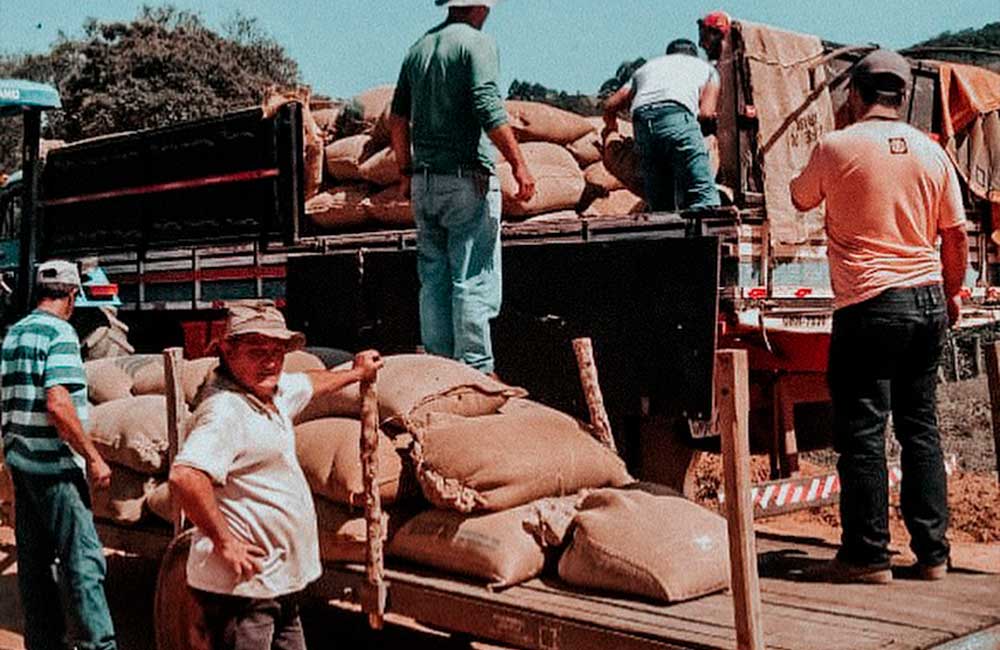
Brazilian coffee growers
The success of Brazilian specialty coffee would not be possible without the effort and dedication of its coffee growers, as well as the support of associations that promote quality, sustainability and fair trade in the industry. Below we highlight some of the main players in this sector:
Featured growers
Fazenda São Silvestre (Cerrado Mineiro): Recognized for its innovation in processes such as carbonic fermentation, this farm produces exceptional lots that combine sweetness, body and complexity.
Pé de Cedro (Minas Gerais): Specializing in the Red Bourbon variety, this farm is known for its artisanal and sustainable approach, offering coffees with creamy body and caramel notes.
Fazenda Vila Boa (Bahia): With a focus on natural and honey processing methods, this farm produces intense and aromatic coffees, characterized by their sweet and exotic profile.
Small producers in Espírito Santo: Although lesser known, farmers in this region are gaining recognition for their high quality Robustas and Arabicas with unique profiles.
Coffee Associations in Brazil
Associations play a key role in the promotion and development of specialty coffee in Brazil, helping to connect producers to the international market and encouraging sustainable practices.
Brazil Specialty Coffee Association (BSCA): Founded in 1991, this organization promotes the quality of Brazilian coffee in the global market, certifies high quality lots and organizes events such as the Cup of Excellence.
Associação dos Cafeicultores do Cerrado: Represents the producers of the Cerrado Mineiro, guaranteeing quality standards and traceability through the region’s Denomination of Origin (DO).
Regional cooperatives: Cooperatives such as Cooxupé (Minas Gerais) and Cooabriel (Espírito Santo) support small producers, promoting fair trade and sustainability.
The impact of producers and associations
Thanks to the joint efforts of coffee growers and associations, Brazil has managed to position itself as a leader in specialty coffee. These actors not only raise quality standards, but also guarantee sustainable practices and a positive impact on coffee growing communities.
How to enjoy and buy specialty coffee from Brazil
Brazilian specialty coffee offers a unique experience that combines tradition, innovation and the distinctive flavors of each region. To get the most out of these exceptional coffees, it is important to consider the right preparation methods and pairings that enhance their qualities. In addition, when buying Brazilian specialty coffee, be sure to choose high quality options that reflect the commitment of its producers.
Recommended Preparation Methods
Preparation methods can highlight different aspects of Brazilian coffee:
V60 or Chemex: Ideal for coffees with complex profiles and fruity notes, such as those from Minas Gerais or Bahia. These methods highlight the sweetness and balanced acidity.
French Press: Perfect for full-bodied coffees with chocolate and nutty nuances, typical of São Paulo and Espírito Santo.
Espresso: An excellent choice for full-bodied coffees, such as those naturally processed in Espírito Santo, which stand out for their creamy texture and deep flavor.
Ideal pairings for Brazilian coffee
Brazilian coffee combines extraordinarily well with a variety of foods, elevating the sensory experience:
Dark Chocolate: Highlights the notes of nuts and cocoa present in coffees from São Paulo and Espírito Santo.
Tropical fruits: Complement the bright acidity and exotic flavors of Bahia coffees.
Nutty desserts: Enhance the natural sweetness and silky body of coffees from Minas Gerais.
Tips for buying specialty coffees from Brazil
If you are looking to enjoy the best coffees from Brazil, here are some practical tips to make an informed purchase:
Look for quality seals: opt for coffees with certifications such as those granted by the Brazil Specialty Coffee Association (BSCA) or recognitions in competitions such as the Cup of Excellence.
Buy fresh: Be sure to choose freshly roasted coffee to enjoy its aromas and flavors to the maximum. Avoid ground coffee if you can grind it at home.
Know the region: Choose specific coffees from regions such as Minas Gerais, São Paulo or Bahia to explore different flavor profiles.
Support sustainability: Look for roasters that work directly with small Brazilian producers, guaranteeing sustainable practices and fair trade.
In our store, you will find a careful selection of Brazilian specialty coffees that stand out for their quality and authenticity. Each bean is a reflection of the passion and effort of Brazilian coffee growers, offering you a unique experience in each cup.

